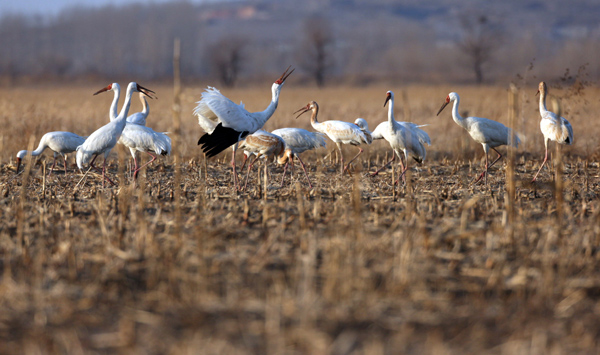White Crane dance takes flight
By Gao Anming, He Na and Wu Yong (China Daily) Updated: 2014-04-03 08:18The perfect environment
|
 |
|
White cranes during their stay in Huanzidong, Liaoning province. Photos by Zou Hong / China Daily |
With a total coverage of 2,300 hectares and water coverage of 1,800 hectares, Huanzidong is much smaller than other wetlands across the world, such as the Pantanal Matogrossense National Park in Brazil, the Isimangaliso Wetlands Park in South Africa, and the Momoge Wetland in China's Jilin province.
| "In the 1980s, the area of wetland was much bigger than it is now. When you stood near the bank in the migratory season, the white cranes would stand on your arms to eat the corn seeds you held in your hands." -- Wang Zhenyou, Zhenzijie village resident "A good environment and large numbers of birds will result in more visitors and indirectly promote tourism and our economy to benefit local people." --Feng Shouquan, Party chief of Faku |
Every spring and autumn, Huanzidong is paradise for the birds. The blue skies are decorated with white clouds, the clear water stretches seemingly endlessly, and the wetland banks are overgrown with reeds in which white cranes shelter or soar high above on outstretched wings.
According to Party secretary Feng, in addition to the white cranes, about 190 species of bird are known to nest and breed in Huanzidong, and 27 of them - including hooded cranes, red-crowned cranes, Oriental white storks and highland guans - are on the national level protection list.
"We have worked out strict regulations to protect Huanzidong and build it into an important international wetland. We also plan to return some 1,300 hectares of farmland surrounding Huanzidong to wetland and make the park a well-facilitated tourist resort to promote environmental protection, education and entertainment within five years," Feng said.
"A good environment and large numbers of birds will result in more visitors and indirectly promote tourism and our economy to benefit local people," he added.
Chen Mingzhong, director of the Faku Forest Bureau, said: "We have strengthened our crackdown on behavior that is harmful to the birds and the wetland. In addition to supervision from the forest police, we have also employed staff to patrol the region every day. Farmers in the surrounding villagers established a voluntary bird and wetlands protection association, which has played an important role in protecting the environment during recent years."
Zhenzijie village resident Wang Zhenyou is one of the farmers in question. The self-confessed bird lover first volunteered to protect the avian visitors in the 1980s.
"In the 1980s, the area of wetland was much bigger than it is now. When you stood near the bank in the migratory season, the white cranes would stand on your arms to eat the corn seeds you held in your hands," recalled the 75-year-old.
"Our association has 22 people now. The patrol region is huge, but for the sake of the birds, we all volunteered to help. In the early years, my family didn't understand me, but now they are all very supportive. Several years ago, we regularly found birds trapped in the reeds and often caught people who hunted them illegally. Thanks to the movement to raise protection awareness, we see a lot less illegal behavior nowadays," he added.
- More female officials caught in corruption
- Whampoa veterans recorded with glory
- Police bust 9 terrorist groups in Xinjiang
- Knife-wielding attackers seized in Xinjiang
- New regulation leads to drop in petitioned cases
- Hunan plant shut as probe into lead poisoning begins
- Police boost efforts to combat gambling
- Project offers jobs openings to legal experts
- Experts: Dog meat festival 'illegal'
- Nation looks to upgrade
pipeline networks






